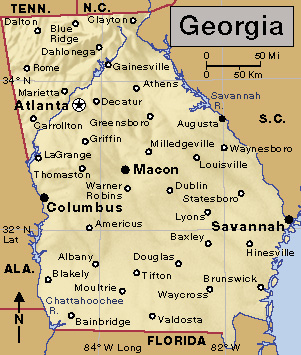Macon << MAY kuhn >> (pop. 157,346; met. area pop. 233,802) is a center of manufacturing and trade and one of the largest cities in Georgia. Macon lies on the Ocmulgee River in central Georgia and is called the Heart of Georgia. Its location helped Macon become a convention center for state and regional meetings.

Macon is the home of the Georgia Academy for the Blind, Middle Georgia State University, Mercer University, and Wesleyan College. The Cherry Blossom Festival each March celebrates the city’s 350,000 Japanese cherry trees. Macon’s Hay House, a historic mansion, and Ocmulgee Mounds National Historical Park, the site of prehistoric Native American mounds, draw many visitors. Other attractions include the Georgia Sports Hall of Fame and the city’s several national historic districts.
Macon serves as the trading center for the famous peach region of Georgia. One of the world’s largest deposits of kaolin, a type of clay, lies near Macon. Products made in Macon include aircraft parts, chemicals, furniture, kaolin-based products, paper products, and zippers. Two railroads provide freight service for Macon, and two interstate highways intersect there. Macon is a regional health center with several hospitals. Other important industries include aerospace, business services, insurance, and tourism. Robins Air Force Base lies 16 miles (26 kilometers) south of Macon.
A Native American people known as the Creek first settled the Macon area. Thomas Jefferson established Fort Hawkins there in 1806. The city was chartered in 1823 and named for Nathaniel Macon, a North Carolina congressman. During the 1840’s and 1850’s, Macon became an important railroad center. Confederates repulsed a Union attack on Macon in 1864, during the American Civil War.
Macon has a mayor-council form of government. It is the county seat of Bibb County.
